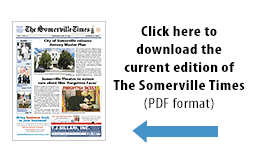By Ashley Taylor
Thursday night, the governing board for Somerville’s new tax increment district met to discuss the rules for its own proceedings and to hash out the financial details of the developments planned for Assembly Square that will be funded through District Improvement Financing. No votes were cast Thursday night, but the decisions underway will shape the administration of the Assembly Row DIF and future DIF’s run by the same decision-making body.
The 12-member DIF Governing Board, which consists of the Mayor and the Board of Aldermen, administers not only the Assembly Row DIF but any future DIF’s the city might create. The mayor is the presiding officer for the DIF Governing Board, and in the mayor’s absence, the President of the Board of Aldermen presides.
To open Thursday’s meeting, Anne Thomas, Special Counsel to the Board of Alderman, presented the Law Department’s revision of rules for the DIF Governing Board. The rules are similar to those for the Board of Aldermen, Thomas said; the main difference between them is that the mayor does not have a vote on the Board of Aldermen, and he does have a vote on the DIF governing board—in some cases, two.
In the case of a tie, as the rules were presented, the presiding officer would have two votes.
That tie-breaker vote came into question Thursday. Alderman at Large William White remarked: “As an elected official, I’ve never been aware of a body where one individual can cast two votes.” Board of Aldermen President Rebekah Gewirtz, of Ward 6, was also wary of the rule: “I think the standard rules should apply, that’s my opinion, that it should be the case that if there’s a tie vote, it doesn’t pass, and then further deliberations happen.”
The board next discussed a consultant’s report about the project’s expected effects on municipal expenses. The Salem-based firm, W-ZHA, concluded that the project would result in two increases in municipal costs to the city in its “first full year of stabilized operations.” The report did not further specify the year, but they cited the tax increment listed in the budget for Fiscal Year 2015 as that year’s increase in real-estate tax revenue.
The project’s 400 new residential units would add a predicted 44 students to public schools, at a projected cost of about $15.5 thousand the first year. Alderman White wondered if that number might be too low. The second expense would be $22 thousand in additional services by the Department On the other hand, the consultants predicted, the city would gain money from increases in vehicle excise and property taxes for a net gain of $2.12 million that first year.
The meeting ended with a brief discussion of the 5-year budget for the DIF for 2012-2016. Most comments from aldermen were about how to interpret the budget, rather than suggestions for amending it.
District Improvement Financing is a state program allowing cities to develop a designated area (the DIF), borrow money based on projected property tax increases expected to result from the developments, and then use the actual increase in property taxes each year (the tax increment) to pay debt service and make further investments.
In December, the Massachusetts Economic Assistance Coordinating Council approved Somerville’s application for a DIF in Assembly Square. The Assembly Square DIF would have three new buildings—including a hotel—and many infrastructure improvements, including an extension of Assembly Square Drive. The planning department expects the three buildings to be occupied by 2014 and the Assembly Square Drive extension to be finished this summer.















Reader Comments